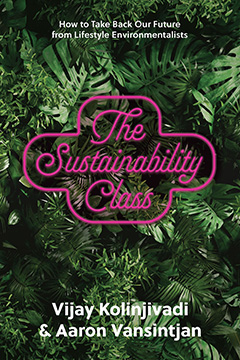Thinking about our current climate situation (aka crisis) often sparks a devastating mix of anxiety and hopelessness. I know I’m not alone in this. The consequences of our careless behavior toward the planet feel overwhelming, while the solutions proposed by governments worldwide are, at best, trivial and, at worst, dismissive or outright harmful. As the metaphorical waves of anxiety (and the literal waves of our rising oceans) threaten to swallow us whole, we watch the likes of Musk, Bezos, Branson, and Gates glide past on their so-called “eco-friendly” gas-guzzling yachts, spouting promises about saving the planet.The hypocrisy can make a person’s skin crawl.
In The Sustainability Class, Vijay Kolinjivadi and Aaron Vanistjan put into (extensively researched) words the unease many of us share when it comes to thinking about certain types of “green” rhetoric – and the kinds of people who most avidly support (or police) it. In other words, the social group they christen the “sustainability class.” Or, as the authors put it, “a demographic of well-meaning middle- and upper-class people who define themselves as liberal or progressive and are very concerned about ecological issues but can only approach them from their class identity.”
The Sustainability Class The New Press
How to Take Back Our Future from Lifestyle Environmentalists
Vijay Kolinjivadi and Aaron Vansintjan
$27.99
cloth
352pp
9781620977439
Though this is a simplification of a very complex book, the major point Kolinjivadi and Vanistjan make in The Sustainability Class is that most “eco-conscious” talk in mainstream media and culture (which also means the Global North) simply upholds the status quo. “It’s glaringly obvious,” they write, “that the people with the most money are also the highest emitters,” and spending more money on “eco-friendly” products like Teslas or enormous passive homes is certainly not going to fix the problem. Neither is alleviating your guilt through these meaningless endeavours or feeling superior for doing so. In other words, it entrenches class divides and alienates the largest section of the world’s population –the working class. The book critiques the charade of carbon offsetting, grossly expensive eco-friendly products, the removal of communities to “re-wild” the earth, and the tech industry’s erasure or displacement of carbon footprint blame (where do you think all that energy fueling your blockchain comes from, asshole?). Not only are efforts like this not doing much, Kolinjivadi and Vanistjan write, but they are actively harmful.
The strongest chapter of the book is the final one. Titled “Taking Back the Future,” the chapter provides examples of meaningful, impactful sustainable movements and outlines several strategies for how to do your part without breaking the bank, fleeing the planet, or feeling morally superior to everyone who isn’t using a bamboo straw. These strategies include reconnaissance (know thine enemy), counter-promoting, and reclaiming imagination, all of which they root in the real-life examples of the Defend Atlanta Forest Movement, a grassroots environmental and social justice initiative focused on protecting the South River Forest, a large urban forest in Atlanta, Georgia, and Unión de Vecinos, a grassroots organization based in Los Angeles that focuses on advocating for social justice, tenant rights, and community empowerment.
Written with a lot of personality, and chock-full of metaphors and examples (both embarrassingly hypocritical “sustainability class” initiatives and hopeful ecological living), The Sustainability Class verges on suffering from what it most vehemently critiques: excess. The level of detail is a little overwhelming; I feel flooded. The authors might have benefitted from less stuffing their argument and more focusing. That said, the book certainly sparked a bunch of personal research threads, and I won’t be forgetting things like the monstrous city of Neom (the ambitious Saudi Arabian urban development project that promises year-round indoor skiing, the world’s largest luxury resort, the upheaval of hundreds of Indigenous people, and the mass exploitation of migrant workers – all while somehow staying carbon neutral), or the all-female vegan anti-poaching army started by Damien Mander anytime soon.mRb






0 Comments